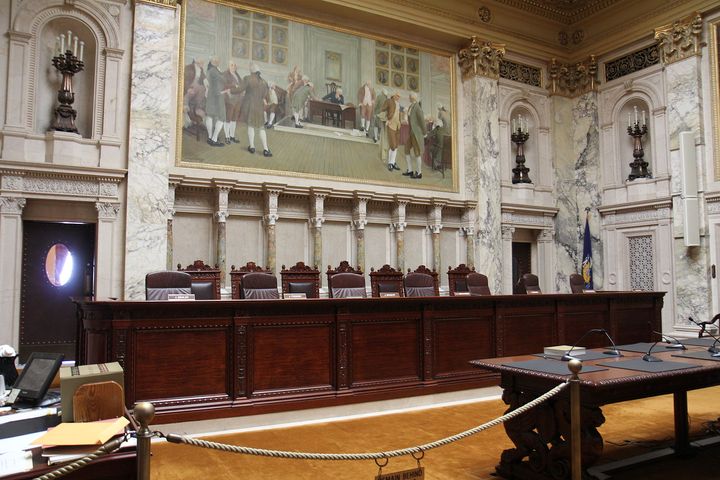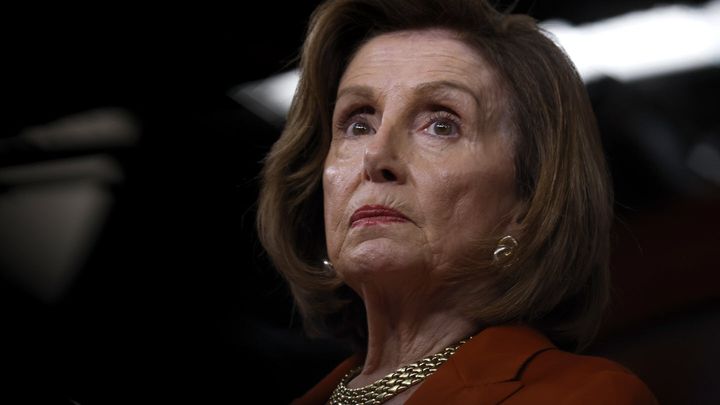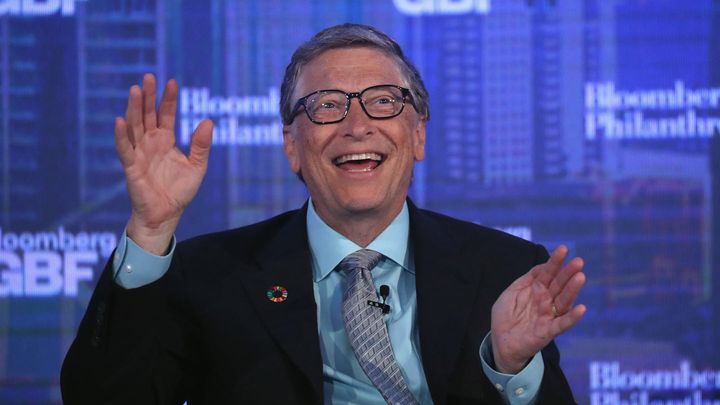Update, Apr. 6, 6pm ET: The Wisconsin Supreme Court reinstated in-person voting in a brief 4-2 ruling, after Gov. Tony Evers issued an order shutting down in-person voting to avoid worsening the coronavirus pandemic.
In a press conference on Friday, President Trump suggested his recent tweet might have been the real cause of Wisconsin Governor Tony Evers’ request for the legislature to postpone in-person voting due to the coronavirus pandemic.
“In Wisconsin, what happened is I through social media put out a very strong endorsement of a Republican, conservative judge, who’s an excellent brilliant judge, he’s a justice, and I hear what happened is his poll numbers went through the roof,” President Trump said.
Despite whatever polling Trump may have seen, there is a lot more impacting the Wisconsin Supreme Court race than his tweets. Two major conservative groups ramped up their spending to boost candidate Justice Daniel Kelly in the week before election day, bringing total television ad spending for Kelly to over $1.4 million, far more than the $400,000 outside groups have spent on TV ads supporting the Democrat-aligned candidate, Judge Jill Karofsky.
The groups buying ads to promote Kelly—Republican State Leadership Committee (RSLC) and Wisconsin Manufacturers and Commerce (WMC)—have ties to the dark money network that spent tens of millions to block President Obama’s Supreme Court pick and to confirm Trump’s.
Both groups have received funding from the Judicial Crisis Network (JCN), a nonprofit that pledged last year to spend $10 million to support Trump’s U.S. Supreme Court pick Brett Kavanaugh, the same amount it spent in 2017 to help confirm Justice Neil Gorsuch. JCN has been heavily funded by the Wellspring Committee, a dark money group with ties to the Koch network that was primarily funded by a single anonymous donor. The Wellspring Committee, which shut down in December 2018, was also a likely conduit for a mysterious $1 million donation to the Trump inaugural committee.
JCN and the Wellspring Committee have both made payments to BH Group, which, according to documents filed at the FEC, is affiliated with Federalist Society executive vice president Leonard Leo, who has worked with national Republicans to install far-right judges. Kelly is a former president and board of advisors member of the Milwaukee Lawyer’s Chapter of the Federalist Society.
The RSLC, a national 527 organization, has been the top outside spender in the race, putting up $824,000 worth of television ads—all in the past ten days—according to figures compiled by the Brennan Center for Justice.
RSLC’s top donor in 2018 was JCN, which gave over $3 million, according to the Center for Responsive Politics. Other RSLC donors in 2018 include Koch Industries, Republican mega-donor Sheldon Adelson, the Republican Governors Association, and leading pharmaceutical and healthcare companies. In 2019, the RSLC took in $1.1 million from JCN, according to a Sludge review of tax forms.
The group’s strategy of unloading ads in the final week of the election, delaying public disclosure of amounts spent, is a repeat of the group’s self-described successful effort in last year’s narrow Wisconsin Supreme Court victory, according to Douglas Keith, counsel in the Brennan Center’s Democracy Program.
“This closely mirrors what Wisconsin saw in 2019, where outside groups on the right laid low until the very end but then in last week dropped well more than a million to support the more conservative candidate,” Keith said, “A few weeks out, they did some polling, found they were down a substantial but not insurmountable amount, determined an investment could change the outcome, and turned out to be right.”
WMC, the state chamber of commerce, has put $608,000 behind the ads attacking Karofsky, according to an estimate from Kantar Media/CMAG. WMC is a business association and is not required to report its spending to the state or to disclose its donors. Since 2007, WMC has been the top spender in support of the court’s current conservative majority, at over $10 million spent along with its ally, the Wisconsin Club for Growth.
Update, Apr. 7, 12pm ET: as of yesterday, television ad spending by Wisconsin Manufacturers and Commerce (WMC) now totals close to $860,000, up from $608,000, according to figures from the Brennan Center.
The WMC also has ties to the Judicial Crisis Network, taking $825,000 from the group in 2015 through its political arm. The association’s CEO, Kurt Bauer, appeared at a February 2017 JCN press conference calling for U.S. Senator Tammy Baldwin (D-Wisc.) to vote for confirmation of Judge Neil Gorsuch. In 2014, the WMC was the subject of an investigation after a bipartisan group of prosecutors alleged illegal coordination with the campaign of Gov. Scott Walker, but the probe was eventually rejected by the U.S. Supreme Court in 2016.
Classic Attack Ads
The RSLC and WMC-funded attack ads accuse Karofsky of being “dangerously soft on crime,” but Politifact confirmed that Karofsky was not the prosecutor involved in the 1999 case mentioned in two of the ads. The ads’ misleading claims prompted a cease and desist letter and then a lawsuit from Karofsky’s campaign to stop them airing, and the videos have been pulled from YouTube.

The RSLC’s and WMC’s ads follow a Republican playbook from previous state judicial races, the Brennan Center’s Douglas Keith told Sludge.
“These are classic attack ads, accusing a candidate of being soft on crime, accusing them of putting children at risk, designed to scare voters,” Keith said. “It’s worth noting there’s nothing to suggest that either of these groups have been concerned with criminal justice, it’s just this is the way they’ve determined they can most easily reach voters.”
“These ads not only mislead voters, they do real harm to the justice system,” Keith continued. “Research shows judges rule more harshly in election years, looking over their shoulder.”
Outside spending has also come from a progressive 527 organization, A Better Wisconsin Together Political Fund, which has spent $400,000 on ads supporting Karofsky. The group’s ads have highlighted Kelly’s record of not recusing himself in cases where a conflict of interest has been raised—most recently, in Kelly’s reversal last month of his decision to recuse himself, given the imminent election, in a case over removing people from the voter rolls.
A Better Wisconsin Together Political Fund and its affiliated nonprofit formed in January, and neither entity has disclosed its donors. The organizations absorbed another leading liberal advocacy organization, One Wisconsin Now, which is an affiliate of ProgressNow. Both One Wisconsin Now and ProgressNow are nonprofits and do not disclose their donors.
Karofsky, in campaign debates since November, has consistently leveled charges of judicial corruption: “We might as well put a ‘for sale’ sign on the Supreme Court because what Dan Kelly wants is to have the money from the outside special interest groups help him win the campaign, and the outside special interest groups want his decisions,” Karofsky said.
In total, Jill Karofsky’s campaign has taken in over $2.5 million, which includes $1.3 million from the state Democratic party; Kelly has raised over $1.8 million, but has taken in only $233,000 from the state Republican party. The Karofsky campaign’s direct television ad spending as of April 3, at over $828,000, has topped that of Kelly’s campaign, with $453,000.
Big GOP Donors Open Wallets
An examination of Kelly’s campaign backers reveals nearly three dozen prominent Republican donors who contributed over $400,000 of his cash, according to Sludge’s review of state campaign finance reports.
One right-wing billionaire giving the maximum $20,000 contribution was GOP mega-donor Diane Hendricks, the richest woman in Wisconsin. In the 2016 cycle, Hendricks put $5.5 million behind the Republican super PAC Reform America Fund to run ads in Wisconsin against Hillary Clinton and U.S. Senate candidate Russ Feingold. The Beloit billionaire is known as a major backer of former Governor Scott Walker and an ally of former top House Republican Paul Ryan’s super PAC, as well as for serving on the board of the rightwing Bradley Foundation and giving to Koch-related causes. Her daughter, Kim Hendricks, chipped in $20,000 as well.
Donald P. Zietlow, a big Republican donor who made two contributions totaling $130,000 to the Trump Victory Committee, also gave $20,000 to Kelly’s campaign—and previously in 2016, gave $50,000 to the Hendricks-backed super PAC. Zietlow was a founder and then owner of the Kwik Trip convenience store chain, headquartered in La Crosse, Wisconsin, whose executives were major donors to the campaigns of Scott Walker between 2010 and 2017.
Patrick J. English, the vice chair of the Milwaukee-based Bradley Foundation, donated $12,000 to Kelly’s campaign. The rightwing foundation finances think tanks, bill-writing groups like ALEC, legal centers, and conservative media in states to promote stricter welfare work requirements, anti-union policies, school privatization, and climate change skepticism. Documents examined by the nonprofit Center for Media and Democracy in 2017 exposed the foundation’s efforts to develop a right-wing “infrastructure” to influence policies in state houses nationwide.
Right-wing megadonor Richard Uihlein, who has given tens of millions of dollars to Republican candidates and causes, such as the Tea Party and the tax-cutting 501(c)4 nonprofit Club For Growth, contributed $10,000. Uihlein is the founder of shipping supplies company Uline, headquartered in the Kenosha County business corridor between Chicago and Milwaukee.
Conservative donor Fred M. Young Jr., a board member of the Cato Institute, gave $10,000, as did his father of the same name and his wife, Sandra Young. In 2013, Young Jr. filed a lawsuit against the state’s campaign contribution limits, arguing that the then-$10,000 aggregate maximum was unconstitutional. (In December 2015, Gov. Walker signed an act raising the individual contribution cap to $20,000.)
The PAC of Wisconsin Realtors gave $18,000 to Kelly’s campaign. Terrence Wall, a real estate developer who ran in the 2010 Republican primary for U.S. Senate, gave $10,000. Business executive John S. Shiely, a director of BMO Harris Bank, gave the same amount, as did John Silseth, president of Milwaukee area private investment firm Antietam LLC.
Both campaigns have seen extensive spending on digital ads alongside the contested television spots. The Facebook Ad Library shows ads supporting Kelly from Wisconsin Family Action, Republican Party of Wisconsin, and Wisconsin Conservative Digest, while progressive group For Our Future WI has sponsored Facebook ads backing Karofsky.
The face-off between Justice Kelly and Judge Karofsky comes after the controversial conservative candidate, Judge Brian Hagedorn, eked out a win last year in the non-partisan elections by 50.2 percent to 49.7 percent, a 5,981 vote difference. With the current conservative majority of 5 to 2, and the coronavirus pandemic’s effects on in-person voting forcing GOTV efforts to adapt, the outcome of Tuesday’s election will determine if liberals are in position to possibly retake the majority in 2023.
Last year’s Supreme Court contest in Wisconsin set a record with $8 million in spending, a December 2019 report from the Brennan Center found, surpassing the Badger State’s $5.3 million court race in 2018. Two days after the narrow 2019 election, and before the liberal-favored candidate had conceded, a post on the group’s site described its strategy in a post titled, “How the RSLC helped win the Wisconsin Supreme Court Race.” The RSLC used amendments to delay disclosure of its more than $1.2 million in micro-targeted voter messages until the day of the election, a November 2019 report found.
State judicial races have become dark money battlegrounds, with over half a billion in spending over the past two decades, the Brennan Center and the National Institute on Money in Politics have documented. Recently the Alliance for Justice Action Campaign, a 501(c)4 non-profit organization, launched a new State Courts Matter project, with resources and news on the 31 states holding Supreme Court elections this year. State courts, which the group emphasizes decide 95% of all cases in the U.S., have played a role in areas such as patient rights, equitable funding of public education, gerrymandering, collective bargaining rights, LGBTQ equality, and immigration enforcement practices.



